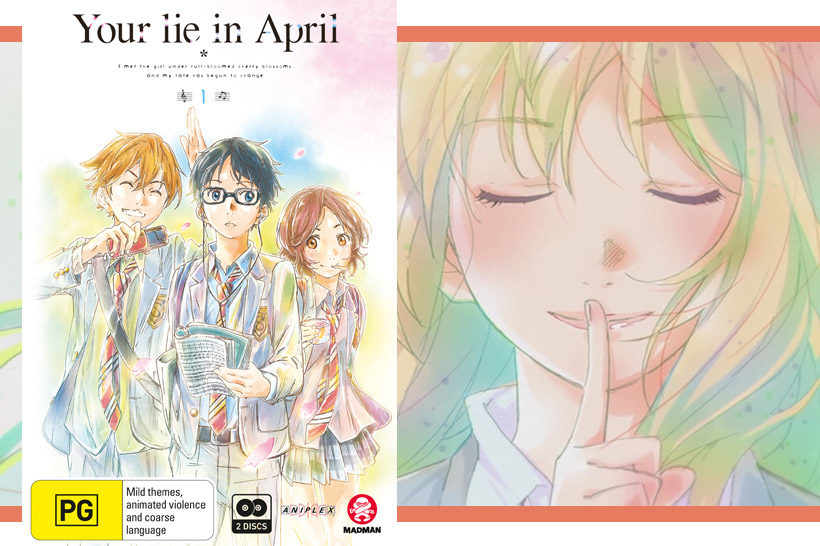When music completely encompasses your life losing the ability to play would undoubtedly be one of your biggest fears. Your Lie in April follows Kousei Arima, who is unable to hear himself play after the traumatic death of his mother. Kousei now adamantly avoids the piano and the competition scene altogether, seemingly content with giving up on everything he’s worked towards thus far. His friends just want what’s best for him, but honestly aren’t the most tactful at the ripe age of 15. Yet through all his turmoil, the young prodigy meets a violinist who turns his whole world upside down; a girl who, against all odds, urges him to perform again.
Growing up as a musician, when I first heard about this show I immediately developed a bias towards it, but that’s not to say that it can’t be enjoyed by everyone. More than just a cute story about music and performance, Your Lie in April portrays serious themes in a way that isn’t seen often in the realm of anime that I frequent. It’s rare that I take the time out of my day to watch shows of this style, but this is one that any anime fan should try out. Drama, romance, and a hint of shounen flair, this show delivers on so many fronts with its music, art, characters and overall style. However, it’s far from perfect, for reasons that I’m sure most fans of the show would agree upon.

Thanks to his mother’s tutelage, Kousei quickly established a name for himself in the world of classical performance, though not everyone saw him in a positive light. “His Mother’s Puppet”, and “Human Metronome” are just two of the colourful titles that the performance community coined for him. Yet even with the high level of animosity thrown his way, whispers of the once great piano prodigy floated around during his two-year absence. While blown way out of proportion, I found that this depiction of how others perceive truly talented individuals in these kinds of environments was accurate. The way the characters interacted with each other with this in mind lead to entertaining and, sometimes, realistic exchanges.
The involvement that Kousei’s mother had in his development doesn’t just end with her death, however. Enter Kaori Miyazono, a girl of the same age as Kousei who doesn’t let anyone else get in the way of what she wants. As the main focus of the story in the first half of the series, the ideals that Saki Arima ingrained within her son conflict heavily with Kaori’s. When the two musicians first meet, Kaori exhibits a boisterous personality that accentuates the dichotomy between the two of them. Yet somehow, through Kaori’s sheer determination, Kousei once again is roped into playing the piano, where he’s able to begin working through the myriad of issues that plague his life.

It is at this point that the relationship Kousei had with his mother is explored in greater depth, with insight given about their lives as Saki’s health deteriorates. She encourages Kousei to play perfectly and surpass everyone, pushing him to the point of physical abuse. Unfortunately, there are moments throughout Your Lie in April where this very serious issue of child abuse that Kousei was subject to is made light of. Several occurrences where his “friends” interrupt dark memories of his past with jarring bouts of slapstick comedy. These instances detract from the show constantly, betraying each character’s persona and never seeming appropriate no matter the context. Ignoring this, the theme definitely adds a lot of substance to the show that would be sorely missed had the studio responsible, A-1 Pictures, avoided developing the show’s characters with such meaningful themes.

Shounen anime often makes use of lengthy battles to develop characters, and Your Lie in April uses its performance segments in the same vein. When looking back at the series as a whole, the highlights mostly derived from these “battle scenes”, which are utilised in a way that gives insight into how the series’ antagonists think, or how Kousei tries to deal with his problems. Taking up whole episodes, sometimes multiple, these performances were the clear, and logical, budget sink for the show.
While emphasis is placed during the characters’ performances, the art is beautiful throughout the entire show. Vibrant colours play a huge role in setting the initial tone, which steadily progresses with the seasons. A lot of striking metaphors and imagery are also employed, with one of my favourite scenes for its music, art and story progression utilising fireflies as an analogy for the relationship developing between Kousei and Kaori.

The issues with Kousei’s mother haven’t been completely resolved, but by the end of this first part of the series Kousei is seemingly beginning to let go of the pain that he’s been struggling with. If nothing else, Your Lie in April shines within it’s genre. The setting isn’t anything out of the ordinary, but so much more is done with it than can be said about other shows of the same type. That being said, it’s difficult to describe what this show primarily is, as the drama and romance aspects contend with each other just as much as the musical aspect that is present at all times.

A review copy was provided by Madman Entertainment to the author for the purpose of this review.





